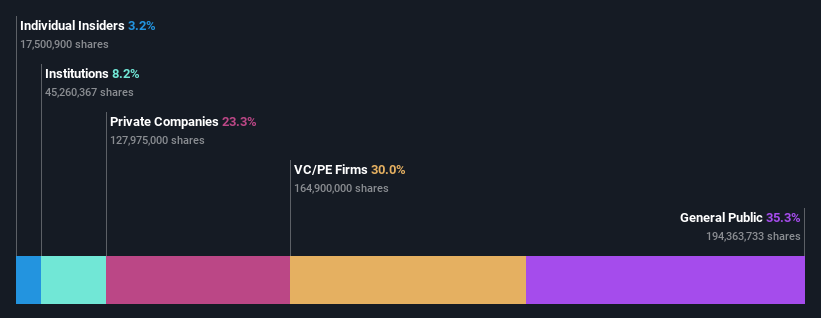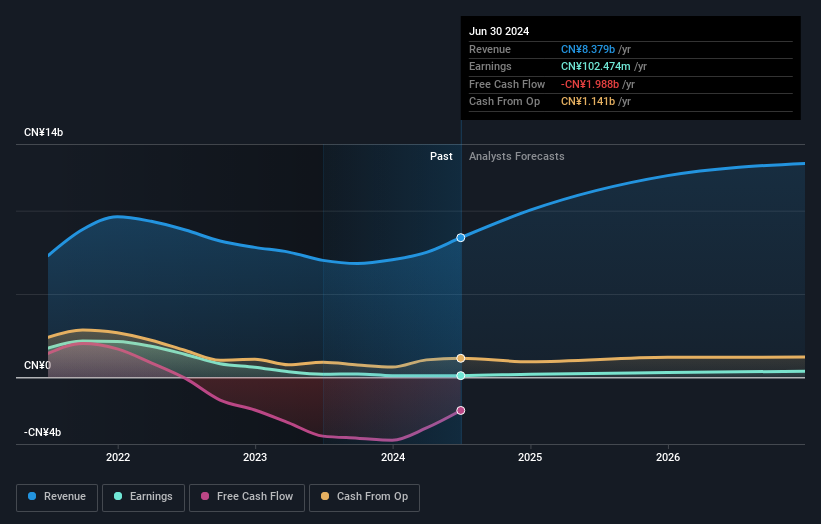Lihuayi Weiyuan Chemical Co., Ltd.'s (SHSE:600955) last week's 5.2% decline must have disappointed individual investors who have a significant stake
Key Insights
- Lihuayi Weiyuan Chemical's significant individual investors ownership suggests that the key decisions are influenced by shareholders from the larger public
- A total of 5 investors have a majority stake in the company with 54% ownership
- Ownership research, combined with past performance data can help provide a good understanding of opportunities in a stock
Every investor in Lihuayi Weiyuan Chemical Co., Ltd. (SHSE:600955) should be aware of the most powerful shareholder groups. With 35% stake, individual investors possess the maximum shares in the company. In other words, the group stands to gain the most (or lose the most) from their investment into the company.
As market cap fell to CN¥7.7b last week, individual investors would have faced the highest losses than any other shareholder groups of the company.
In the chart below, we zoom in on the different ownership groups of Lihuayi Weiyuan Chemical.
See our latest analysis for Lihuayi Weiyuan Chemical

What Does The Institutional Ownership Tell Us About Lihuayi Weiyuan Chemical?
Many institutions measure their performance against an index that approximates the local market. So they usually pay more attention to companies that are included in major indices.
We can see that Lihuayi Weiyuan Chemical does have institutional investors; and they hold a good portion of the company's stock. This implies the analysts working for those institutions have looked at the stock and they like it. But just like anyone else, they could be wrong. If multiple institutions change their view on a stock at the same time, you could see the share price drop fast. It's therefore worth looking at Lihuayi Weiyuan Chemical's earnings history below. Of course, the future is what really matters.

We note that hedge funds don't have a meaningful investment in Lihuayi Weiyuan Chemical. Weiyuan Holdings Co., Ltd. is currently the largest shareholder, with 20% of shares outstanding. Meanwhile, the second and third largest shareholders, hold 11% and 9.9%, of the shares outstanding, respectively. In addition, we found that Xiumin Li, the CEO has 0.6% of the shares allocated to their name.
Our research also brought to light the fact that roughly 54% of the company is controlled by the top 5 shareholders suggesting that these owners wield significant influence on the business.
While studying institutional ownership for a company can add value to your research, it is also a good practice to research analyst recommendations to get a deeper understand of a stock's expected performance. While there is some analyst coverage, the company is probably not widely covered. So it could gain more attention, down the track.
Insider Ownership Of Lihuayi Weiyuan Chemical
While the precise definition of an insider can be subjective, almost everyone considers board members to be insiders. The company management answer to the board and the latter should represent the interests of shareholders. Notably, sometimes top-level managers are on the board themselves.
I generally consider insider ownership to be a good thing. However, on some occasions it makes it more difficult for other shareholders to hold the board accountable for decisions.
Our most recent data indicates that insiders own some shares in Lihuayi Weiyuan Chemical Co., Ltd.. This is a big company, so it is good to see this level of alignment. Insiders own CN¥247m worth of shares (at current prices). If you would like to explore the question of insider alignment, you can click here to see if insiders have been buying or selling.
General Public Ownership
The general public, who are usually individual investors, hold a 35% stake in Lihuayi Weiyuan Chemical. While this size of ownership may not be enough to sway a policy decision in their favour, they can still make a collective impact on company policies.
Private Equity Ownership
With a stake of 30%, private equity firms could influence the Lihuayi Weiyuan Chemical board. Sometimes we see private equity stick around for the long term, but generally speaking they have a shorter investment horizon and -- as the name suggests -- don't invest in public companies much. After some time they may look to sell and redeploy capital elsewhere.
Private Company Ownership
We can see that Private Companies own 23%, of the shares on issue. It might be worth looking deeper into this. If related parties, such as insiders, have an interest in one of these private companies, that should be disclosed in the annual report. Private companies may also have a strategic interest in the company.
Next Steps:
It's always worth thinking about the different groups who own shares in a company. But to understand Lihuayi Weiyuan Chemical better, we need to consider many other factors. Like risks, for instance. Every company has them, and we've spotted 2 warning signs for Lihuayi Weiyuan Chemical (of which 1 is a bit concerning!) you should know about.
If you would prefer discover what analysts are predicting in terms of future growth, do not miss this free report on analyst forecasts.
NB: Figures in this article are calculated using data from the last twelve months, which refer to the 12-month period ending on the last date of the month the financial statement is dated. This may not be consistent with full year annual report figures.
Have feedback on this article? Concerned about the content? Get in touch with us directly. Alternatively, email editorial-team (at) simplywallst.com.
This article by Simply Wall St is general in nature. We provide commentary based on historical data and analyst forecasts only using an unbiased methodology and our articles are not intended to be financial advice. It does not constitute a recommendation to buy or sell any stock, and does not take account of your objectives, or your financial situation. We aim to bring you long-term focused analysis driven by fundamental data. Note that our analysis may not factor in the latest price-sensitive company announcements or qualitative material. Simply Wall St has no position in any stocks mentioned.
 Index Options
Index Options CME Group
CME Group Nasdaq
Nasdaq Cboe
Cboe TradingView
TradingView Wall Street Journal
Wall Street Journal